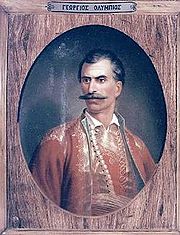Giorgakis Olympios
| Giorgakis Olympios | |
|---|---|
 |
|
| Native name | Greek: Γιωργάκης Ολύμπιος Romanian: Iordache Olimpiotul |
| Born | 1772 Livadi, Larissa, Ottoman Empire |
| Died | 1821 (aged 48–49) Neamţ, Moldavia |
| Allegiance | |
| Battles/wars |
|
Giorgakis Olympios (Greek: Γιωργάκης Ολύμπιος; Romanian: Iordache Olimpiotul; 1772–1821) was a Greek armatolos and military commander during the Greek War of Independence against the Ottoman Empire. Noted for his activities with the Filiki Eteria in the Danubian Principalities, he is considered to be a leading figure of the Greek Revolution.
Olympios was of Aromanian origin. He was born in the village of Livadi, near Larissa, on Mount Olympus, in Ottoman-ruled Greece. After joining the Armatolikia in the Olympus area around the age of 20, Olympios became a prominent member of the local society by protecting villages from the Ali Pasha's raids, when the powerful Pasha started expanding his authority out of Epirus. In 1798, however, he was forced to abandon his birthplace, due to Ali Pasha's hostility towards him, and fled to Serbia, where he collaborated for some time with Karađorđe Petrović during the First Serbian Uprising (he is known in Serbia as Kapetan Jorgać, Captain Giorgakis).
Olympios became a supporter of the ideas diffused by Rigas Feraios for a common Balkan revolution against the Ottoman rule, and moved to Wallachia. There, with the help of Constantine Ypsilantis, he composed a military force of Greeks to fight alongside the Russian Empire in the Russo-Turkish War of 1806. After the Battle of Ostrova, he was named a Polkovnik in the Russian Army. Emperor Alexander I included him in the Russian military escort during the Congress of Vienna, where Olympios met with Alexander Ypsilantis, a Filiki Eteria leader.
...
Wikipedia
